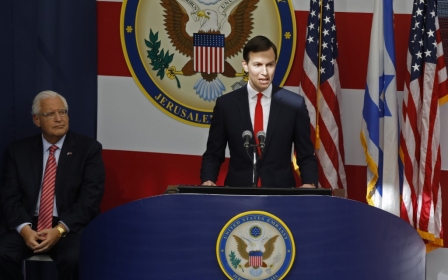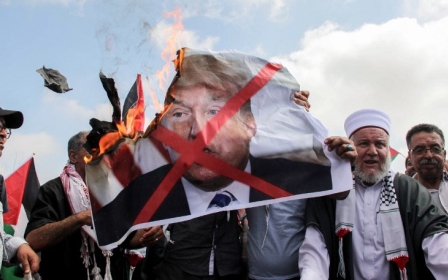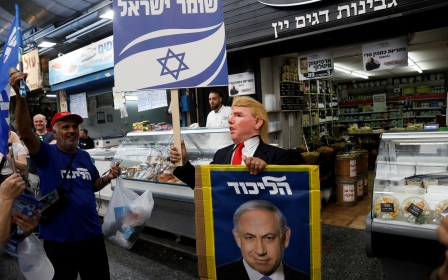Jared Kushner's ‘deal of the century’ was designed to fail from the start
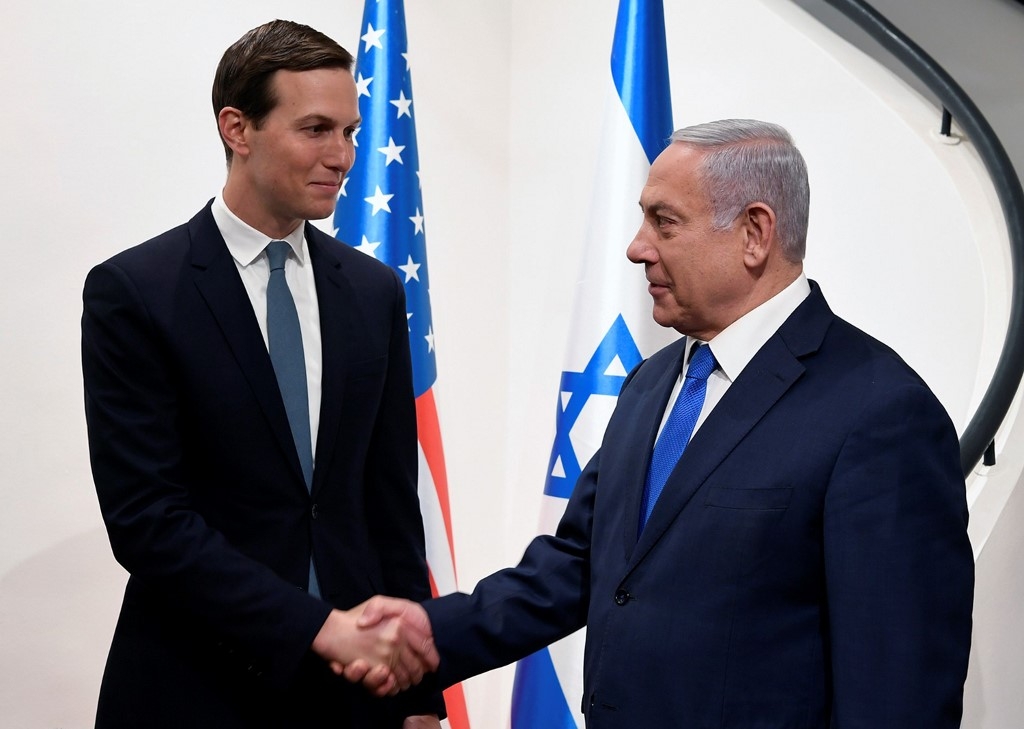
US President Donald Trump’s son-in-law and Middle East peace negotiator, Jared Kushner, doesn’t give many interviews - so when he does, the media is not only riveted, but poised to pounce. And pounce certain segments of the US media did, after Kushner’s HBO Axios interview on 2 June.
Slate published a piece under the headline: “The Most Cringeworthy Answers From Jared Kushner’s Axios Interview.” Vanity Fair opined: “In a comically disastrous interview, the first son-in-law botched answers on birtherism, refugees, Saudi Arabia, and his Middle East peace plan.” CNN was a trifle kinder, settling for a selective line-by-line evisceration of the “29 most eyebrow-raising lines” from the interview.
The assumption from these and other esteemed publications in the liberal media establishment that Trump loves to hate is that Kushner is at best an idiot savant, blissfully wandering through a complex landscape with no idea of the dangers lurking - that he is a rich and privileged kid with a chequered history of wheeling and dealing in real estate and a wife who is the president’s favourite daughter, and that he is way out of his league.
Winning by losing
These assumptions are wrong. From the moment Kushner was assigned the Middle East brief, he has played a subtle, and thus far effective, hand on behalf of both the West Bank settler movement and family friend Benjamin Netanyahu, the Israeli prime minister.
New MEE newsletter: Jerusalem Dispatch
Sign up to get the latest insights and analysis on Israel-Palestine, alongside Turkey Unpacked and other MEE newsletters
Kushner, whose family foundation has given generously to settler projects, has carefully constructed a strategy designed to win by losing. The “deal” was never intended to work.
Rather, its modus operandi is to force Palestinians into a corner from which there is no escape, and where the only answer to the peace deal is “no”. Kushner learned this trick from his days of allegedly acquiring rent-controlled properties, forcing sitting tenants out, refurbishing the flats and then putting them back on the market as luxury properties.
The deal that was never intended to be a deal is coming apart, and Kushner is going to have his work cut out holding it together
It is a squeeze play: a combination of withdrawal of services, together with an offer of some financial compensation, nicely wrapped in veiled and not-so-veiled threats, along the lines of “accept this or it only gets worse”. Kushner has neatly applied the lessons learned in Manhattan to the “deal of the century” in the Middle East.
He seized his opportunity when Trump surprised the world by winning the presidency in November 2016. In December of that year, Trump announced that bankruptcy lawyer David Friedman was his nominee as US ambassador to Israel.
In March 2017, Friedman, who has a long history of supporting the illegal settler movement in the West Bank, was duly confirmed by the Senate. Kushner was handed the Middle East portfolio, while another Trump lawyer and hardline settler advocate, Jason Greenblatt, joined him as an envoy.
Killing the two-state solution
Kushner convinced the president that his first overseas trip should be to Saudi Arabia in May 2017. By that point, Kushner had already established a close working relationship with Deputy Crown Prince Mohammed bin Salman, who subsequently became the crown prince. A crucial element of Kushner’s strategy was to wean the Saudis off the Arab Peace Initiative proposed in 2002 by former Saudi King Abdullah, who was then the crown prince.
Integral to Abdullah’s plan was the recognition of a viable Palestinian state, side-by-side with Israel. Kushner appeared, at least in private, to have successfully killed off Abdullah’s two-state solution, as Saudi Arabia and other Gulf states, notably the United Arab Emirates, moved closer to Israel.
In December 2017, the president announced that the US embassy would move to Jerusalem. Experts were mystified, and Trump was attacked for giving something away and getting nothing in return. But Kushner wasn’t looking for anything: He simply wanted to make a big statement in the face of the Palestinians. He did, and the US got away with it: on 14 May 2018, the 70th anniversary of the founding of Israel, the embassy opened in Jerusalem, while around 90 kilometres away, Palestinians were being gunned down on the Gaza border.
By that time, the president had announced the US was abandoning the two-state solution. Pouring salt into the wound, Washington cut more than half of its planned funding ($65m out of a $125m aid package) to UNRWA, the UN agency for Palestinian refugees that supports more than five million registered refugees. Slowly and inexorably, the screws were being tightened.
Hammer blows fall
In August 2018, the US cut more than $200m in economic aid, then followed that up by withdrawing the rest of the UNRWA funding. In September, one of the few remaining aid programmes, $25m for Palestinians in East Jerusalem hospitals, was ended. Then, the Palestine Liberation Organisation office in Washington, the formal diplomatic link with the Palestinians, was shut down.
As the hammer blows fell and fell, Western governments said nothing. Kushner knew, beyond a doubt, that he was winning.
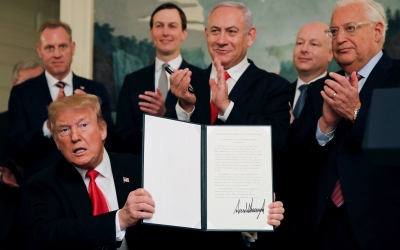
Next up was the Golan Heights, annexed by Israel with the full backing and approval of the Trump administration in March. A win by Netanyahu in the Israeli election in April was to be the cherry on the cake to then drive through the incorporation of the West Bank settlements into a greater Israel.
Alas for Netanyahu and Kushner, fate, in the form of Avigdor Lieberman, intervened. The ex-defence minister and Netanyahu’s arch-rival refused to enter a coalition, upending the applecart and forcing a new election in September.
Trump was not happy. His plan, looking ahead to 2020 and a re-election bid, was to impress his base by rewarding Israel and putting Palestinians in their place. “Israel’s all messed up with their election,” he said. “Bibi got elected, now all of the sudden they’re going to have to go through the process again, until September? That’s ridiculous. So we’re not happy about that.”
Unshakeable confidence
Meanwhile, the Gulf Arab states have been cooling in their ardour for the Kushner deal. Bin Salman’s father, King Salman, has rebuked his son’s support for Israel, while publicly rehabilitating the two-state solution. The deal that was never intended to be a deal is coming apart, and Kushner is going to have his work cut out holding it together.
Kushner does not have a good poker face. His arrogance and the assurance that he is winning shines through in everything he says and does. But his critics are wrong to underestimate him.
Kushner has played a mean hand thus far. His confidence that he will win it all for the settler movement and a greater Israel, for Netanyahu or whoever his successor is, and for his father-in-law, the president, remains utterly unshaken.
The views expressed in this article belong to the author and do not necessarily reflect the editorial policy of Middle East Eye.
Middle East Eye delivers independent and unrivalled coverage and analysis of the Middle East, North Africa and beyond. To learn more about republishing this content and the associated fees, please fill out this form. More about MEE can be found here.




